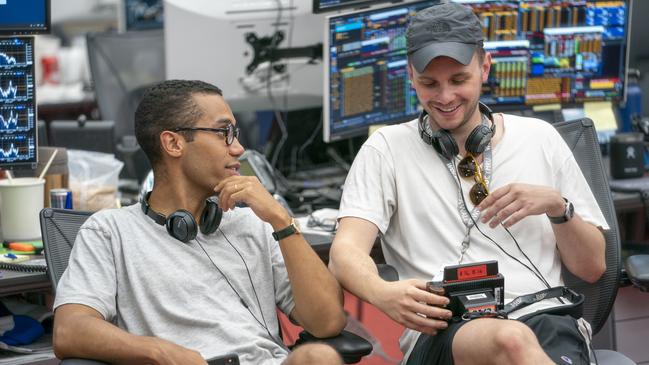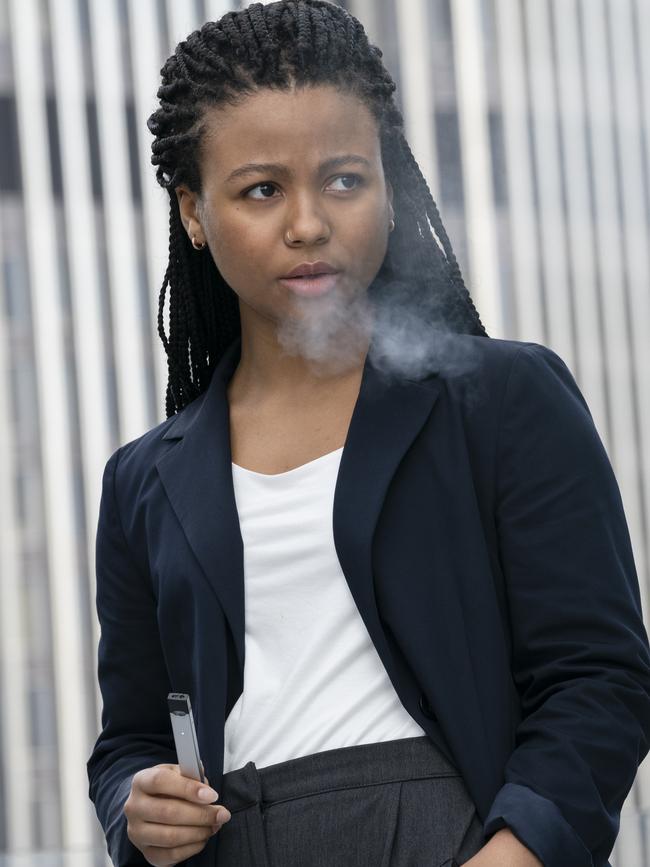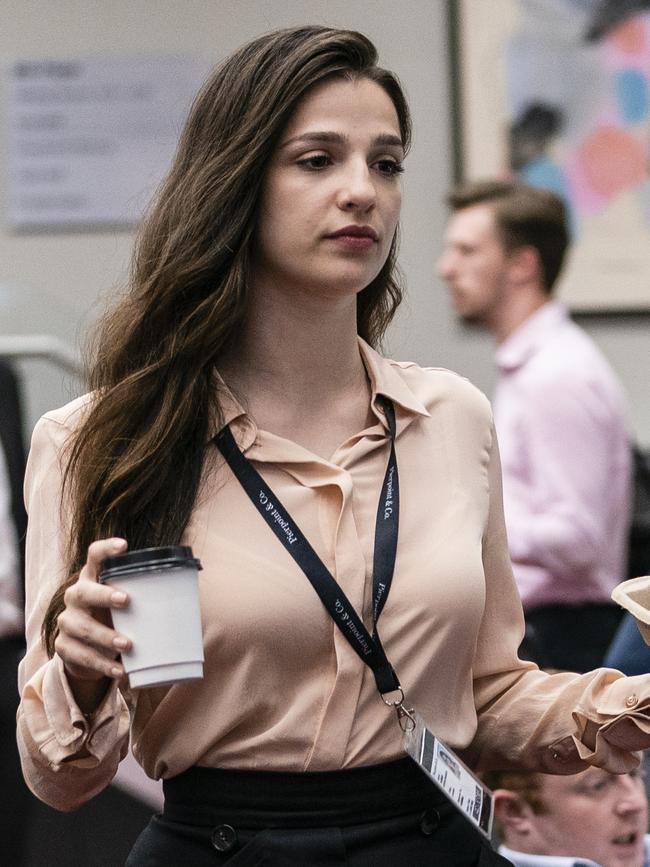Meet the bankers who created Industry, TV’s hottest new show
Sex, drugs and derivatives. Industry is set in the world of finance, but looks at starting out in any high-stress career.

Most shows about finance, like Billions, are about power struggles at the top. The new HBO drama, Industry, set largely on the trading floor of a fictional London investment bank, follows graduates at the very bottom of the ladder. Still on probation, they’re fearful, precocious and smug all at once. As the generic title suggests, this is a series about all sorts of workplaces. It’s about negotiating the hierarchy, passive-aggressive bosses and colleagues, and the fine line between friend and co-worker. But the specific world in which it takes place, of foreign exchange derivatives and mismatched trades, is also important.
Industry is about being seduced and then defined by a job — and the eye-popping money on offer is the carrot leading these interns by the nose. The show streams on Binge from today.
Creators Mickey Down and Konrad Kay know of which they speak. In fact, they were toiling away in mergers and acquisitions (Down) and equity sales (Kay) less than a decade ago. The pair met at Oxford, and recall being courted by the big banks from their very first year. The jobs they accepted upon graduation were an easy way to be financially independent and look in many respects like a fully fledged adult. Down has said that, in retrospect, the gig was a placeholder for a personality.
He jumped ship after little more than a year while Kay lasted another two. In 2014 the friends wrote and directed Gregor, a micro-budget comedy feature that was nominated for a British independent Film Award. The film “didn’t make that much buzz”, according to Down, but it got them into rooms with the right people.
One of them was producer Jane Tranter, who discovered their background in banking and encouraged them to write about it from the vantage point they knew: not from the top down but the bottom up. Tranter pitched the idea to HBO, which quickly commissioned scripts. A long development process followed, with initial drafts labouring, the writers now admit, under a certain weight of expectation. “We were writing an HBO prestige drama, quote-unquote,” recalls Down, “and we thought it had to be really serious.” What was missing, he says, was a sense of fun.
“HBO actually gave us a really good note: you’re writing about characters in the third act of their stories, rather than the first act. Because we were writing from the perspective of people who had been chewed up and spat out — we were writing from a place of bitterness. And writing as a cathartic exercise rather than actually trying to capture the excitement, however short-lived, that we had when we started the job.”

That sense of excitement comes through palpably in the finished product, aided hugely by Canadian producer Nathan Micay’s 80s-inflected synth score, which sounds like a starburst. The euphoria it conjures is connected to independence, yes, but also to the drugs these kids guzzle like candy, not to mention all the sex — which some have criticised as gratuitous.
The screenwriters disagree, arguing forcefully that, in fact, every sex scene is telling the audience something either about an individual character or a power dynamic between characters. As Down points out, “there’s actually only about five or six sex scenes in the entire show. I honestly think it’s because they don’t have any music on them, which is a creative decision we made in the editing process. Sex scenes without music and with added sound design feel a lot more complicit. They’re … stark”.
The brief was to make the sex scenes frank, rather than graphic, in a manner not dissimilar to HBO’s earlier hit, Girls. Unsurprisingly, that show’s creator, Lena Dunham, was tapped to direct the pilot. Over breakfast with the showrunners in a London hotel, Dunham admitted she knew nothing about finance but recognised the people at the centre of it. Longtime admirers of Girls, they jumped at the chance to work with her — not least, according to Kay, because “she’s an HBO brand name, and we thought it would be a strong piece of marketing out of the gate. And, you know, it’s a tough show to market. Creators that nobody has ever heard of, actors nobody’s ever heard of, and a world that people generally don’t like to hang out in … so we thought [getting Dunham] was a bit of a slam-dunk, really”.
The result is a show that’s sexy as well as funny. That’s propulsive and detailed above all. Running to eight episodes, Industry avoids the kind of heightened storylines — about insider trading or even murder — found in series that might be considered adjacent. Instead, the crises are everyday. One episode sees Harper (the closest thing the series has to a lead) wipe out the day’s profits after stuffing up a trade. She has to scramble to recoup before her boss finds out, and it’s gripping as well as anxiety-inducing. Harper is a black American with murky college records but plenty of natural talent. She ends up moving in with Yasmin, a Notting Hill rich girl still living with her mother. Both fancy Rob (Harry Lawtey), an Oxbridge lad who comes from a working-class background and is housemates with Gus (David Jonsson) — black, gay and an Old Etonian. These four work in different junior roles on the trading floor, but each knows they’ll be out of a job in six months unless they can prove they bring value. And the pathos comes from their halting attempts to reach out to one another while directly competing for the golden ticket, sometimes ruthlessly so.


The show’s sympathy for its leads, and the perspicuity of the writing, means it neatly dodges the obvious. This is not a story about a Faustian pact, or at least not in such black and white terms. Some of the most authentic moments in Industry, in fact, are when we glimpse the light disdain these young people have for contemporaries who spout moralistic pieties about capitalism or work as “creative entrepreneurs” but seem to spend their days doing absolutely nothing. This kind of honest texture has meant that responses to the show have been varied, to say the least. Is it about the parasitic nature of the markets — the way it sucks our best and brightest dry — and some kind of metaphor for capitalism writ large? Or is it a show about the endlessly discussed clash between millennials and older generations, with the office as battlefield? For the writers, the response has been fascinating.
“If you create something that’s detailed enough and not didactic or moralising, and you just present something, the really good stuff tends to be a Rorschach test for people’s own worldview,” says Kay. “Therefore, the multitude of responses sort of vindicates the product, if that makes sense. The meaning of the show is somehow … ex-authorial. I don’t want Bret Easton Ellis to come up and tell me what American Psycho’s about. I have no interest in that. It can be about 10 things, it can be about one thing. And that jump from authorial intent to what the audience make of it is such an important thing.”
Having that confidence is no mean feat, especially for two screenwriters barely out of their 20s. And it’s a “high-risk strategy”, as Kay admits, because there’s a decent chance you’ll be misconstrued. “I think there’s a tendency in TV to hold the audience’s hand all the time. And I understand the impulse, actually. To say: this is what this means. I don’t feel particularly engaged by that kind of stuff, and I know Mick feels the same way, but the risk you run [doing otherwise] is that people will give you a superficial reading. There’s this idea that because it’s not about one thing, it’s not about anything.”
HBO has already commissioned a second season, and Kay and Down have already plotted it out. Given the sheer number of nationalities represented so far, and the fact they’ll be able to expand the mosaic after the first season’s success, might we see an Australian on the floor? “We’ve got to bring one in!” laughs Kay. “Because there’s so many working in banking, especially in London.”
Wrapping up promotional duties for now, the two are eager to sit down and write. “We have an outline for every episode. We know how it ends. Which is something we didn’t have in the first season, because we wrote the first two episodes in a vacuum. It’s fun to know what the characters sound like. For them to actually exist in the world.”
Industry streams on Binge from Monday.

To join the conversation, please log in. Don't have an account? Register
Join the conversation, you are commenting as Logout